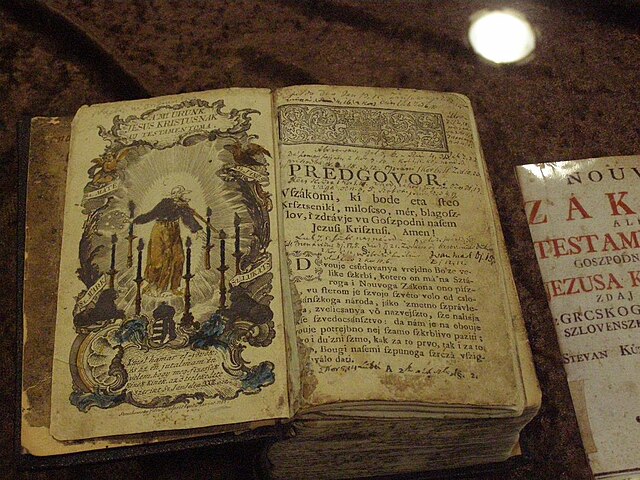Slovene or Slovenian is a Western member of South Slavic languages, which belong to the Balto-Slavic branch of the Indo-European language family. Most of its 2.5 million speakers are the inhabitants of Slovenia, majority of them ethnic Slovenes. As Slovenia is part of the European Union, Slovene is also one of its 24 official and working languages. Its syntax is highly fusional and characterized by dual grammatical number. Two accentual norms are used. Its flexible word order is often adjusted for emphasis or stylistic reasons, although basically it is a SVO language. It has a T–V distinction: the use of the V-form demonstrates a respectful attitude towards superiors and the elderly, while it can be sidestepped through the passive form.
![Tombstone of Jožef Nahtigal in Dobrova with archaic Slovene onikanje in indirect reference. Literal translation "Here lie [počivajo] the honorable Jož](https://upload.wikimedia.org/wikipedia/commons/thumb/3/3b/Jozef_Nahtigal_tombstone_in_Dobrova_Slovenia.jpg/399px-Jozef_Nahtigal_tombstone_in_Dobrova_Slovenia.jpg)
Tombstone of Jožef Nahtigal in Dobrova with archaic Slovene onikanje in indirect reference. Literal translation "Here lie [počivajo] the honorable Jožef Nahtigal ... they were born [rojeni] ... they died [umerli] ... God grant them [jim] eternal peace and rest."
The South Slavic languages are one of three branches of the Slavic languages. There are approximately 30 million speakers, mainly in the Balkans. These are separated geographically from speakers of the other two Slavic branches by a belt of German, Hungarian and Romanian speakers.
Prekmurje dialect Lutheran New Testament, the Nouvi Zákon, in the 18th-century

![Tombstone of Jožef Nahtigal in Dobrova with archaic Slovene onikanje in indirect reference. Literal translation "Here lie [počivajo] the honorable Jož](https://upload.wikimedia.org/wikipedia/commons/thumb/3/3b/Jozef_Nahtigal_tombstone_in_Dobrova_Slovenia.jpg/399px-Jozef_Nahtigal_tombstone_in_Dobrova_Slovenia.jpg)
